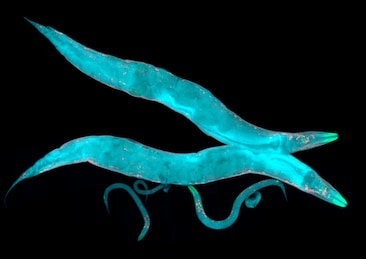2020 NIMBioS SRE Program
Agent-based simulation of Caenorhabditis elegans
Participants:
Matthew Clark, Computer Science, Mathematics, Fisk Univ.
Chelsea Seggern, Kinesiology, Univ. of Tennessee
Anna Thomas, Mathematics, Computer Science, Lehigh Univ.
Mentors:
Dr. Xiaopeng Zhao, Mechanical, Aerospace and Biomedical Engineering, Univ. of Tennessee
Dr. Tian Hong, Biochemistry & Cellular and Molecular Biology, Genome Science & Technology, Univ. of Tennessee
 Project Description.
Caenorhabditis elegans (C. elegans) is an ideal model organism for biomedical research due to its short life cycle, simple genetics, transparent body, and ease of cultivation. The embryogenesis of C. elegans is about 12-14 hours. Although a fully grown C. elegans has no more than 1000 body cells, it has well-differentiated organs, such as muscles, nerves, gut cells, etc. Despite its simple body structure, researchers can use C. elegans to elicit information about more complex biological functions in humans and other animals. This project aims to develop a research and teaching tool using agent-based modeling (ABM) approaches of C. elegans. The ABM model will simulate the early to mid-embryogenesis stages up to 300 cells. The model will include a complete description of the lineage tree. A number of rules will be defined based on biological observations to simulate cell division, orientation, and migration. The simulation is a stochastic process to account for random variation in cell division time, polarity, fate etc. The ABM will be written in Python. A user-friendly interface will be created for ease of examining and visualizing the simulation results. Scripts of the model will be uploaded to an open forum, such as Github, to allow open access. The model can be easily modified to describe signal pathways in more complex organisms. Methods to analyze the sensitivity of model outputs to input rates will be used by the students.
Project Description.
Caenorhabditis elegans (C. elegans) is an ideal model organism for biomedical research due to its short life cycle, simple genetics, transparent body, and ease of cultivation. The embryogenesis of C. elegans is about 12-14 hours. Although a fully grown C. elegans has no more than 1000 body cells, it has well-differentiated organs, such as muscles, nerves, gut cells, etc. Despite its simple body structure, researchers can use C. elegans to elicit information about more complex biological functions in humans and other animals. This project aims to develop a research and teaching tool using agent-based modeling (ABM) approaches of C. elegans. The ABM model will simulate the early to mid-embryogenesis stages up to 300 cells. The model will include a complete description of the lineage tree. A number of rules will be defined based on biological observations to simulate cell division, orientation, and migration. The simulation is a stochastic process to account for random variation in cell division time, polarity, fate etc. The ABM will be written in Python. A user-friendly interface will be created for ease of examining and visualizing the simulation results. Scripts of the model will be uploaded to an open forum, such as Github, to allow open access. The model can be easily modified to describe signal pathways in more complex organisms. Methods to analyze the sensitivity of model outputs to input rates will be used by the students.

|
 |
| Chelsea Seggern | Anna Thomas |
Return to SRE 2020.
NIMBioS
1122 Volunteer Blvd., Suite 106
University of Tennessee
Knoxville,
TN 37996-3410
PH: (865) 974-9334
FAX: (865) 974-9461
Contact NIMBioS


